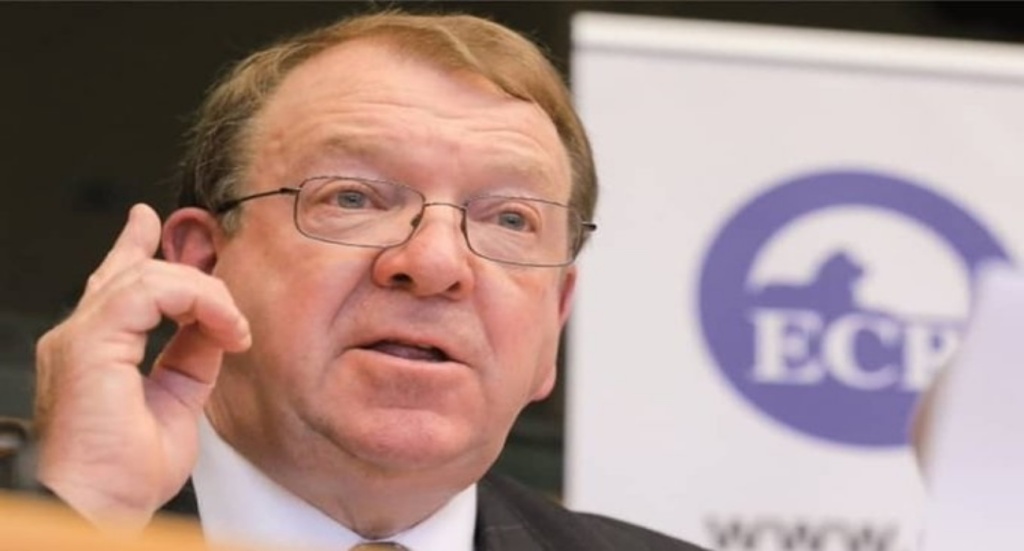International Dignitaries Rally for a New Iran Policy, Support NCRI as Democratic Alternative


By Struan Stevenson
When Assadollah Assadi, the Iranian ‘diplomat’ jailed for 20 years in Belgium for a terrorist bomb plot, was released in a farcical deal with the Iranian regime and returned to a hero’s welcome in Tehran, many thought the EU’s appeasement policy had reached rock bottom. Warnings were sounded that the release of Assadi would embolden the mullahs to attempt a further bomb attack or assassination attempt on European soil. The warnings were ignored and sure enough, in November 2023, a hitman financed by the Iranian regime attempted to assassinate Alejo Vidal Qudras, a former senior vice president of the European Parliament. Mr Vidal Qudras was shot in the face, in broad daylight, outside his home in Madrid. He miraculously survived.
Following Assadi’s arrest for attempting to bomb an Iranian opposition rally in Paris in 2018, Spanish socialist Josep Borrell, the EU’s high Representative for Foreign Affairs and Security said nothing. When Assadi was sentenced to a maximum 20-year term for terrorism, Borrell said nothing. When the terrorist diplomat was released and sent back to Tehran, Borrell said nothing. When Alejo Vidal Quadras was shot in the face, Borrell made little more than a muted complaint. No attempt was made to condemn the Iranian regime for its criminal behavior.
We shouldn’t be surprised. The first country that Borrell visited within days of taking office in December 2019 was Iran, where he met the then president – Hassan Rouhani and foreign minister Javad Zarif. Borrell pledged to “preserve” the defunct nuclear deal from which President Trump had unilaterally withdrawn America in 2018, promising that Iran would “benefit economically from sanctions lifting.” Borrell’s insipid inaction was simply the continuation of decades of appeasement by the EU and its European External Action Service (EEAS).
The post of EU High Representative for Foreign Affairs and Security was created following the adoption of the Treaty of Amsterdam in 1997. Javier Solana, a Spanish socialist, became the first High Representative. He served in that role as the EU’s top diplomat from 1999 to 2010. At a press conference in Washington in 2002, the National Council of Resistance of Iran (NCRI), the main democratic opposition movement to the mullahs, led by the charismatic Maryam Rajavi, had revealed the existence of the Iranian regime’s top-secret nuclear programme. Western intelligence agencies were caught by surprise and governments around the world were stunned. Solana was sent to Tehran to negotiate with the mullahs, offering them a package of incentives in exchange for a reduction in their uranium enrichment program.
But when the mullahs heard that Maryam Rajavi had been invited to address a meeting in the European Parliament, they threatened to boycott talks with Solana. He frantically telephoned prime ministers and presidents around the EU urging them to stop Rajavi’s visit. Learning that she could be blamed for undermining Solana’s negotiations, Rajavi voluntarily withdrew from her proposed meeting, but warned that the mullahs were bluffing and that they couldn’t be trusted. She was right. The theocratic regime thumbed its nose at the west’s compromise offers, forcing Solana, in a speech to the European Parliament, to concede that “there has been no progress. Iran continues to ignore us.”
Solana’s disastrous term in office was followed by two further equally ignominious high representatives. Baroness Catherine Ashton, a British socialist, was nominated by Tony Blair and held the post from 2009 to 2014. She had no previous experience in foreign policy and was well out of her depth, offering the mullahs concession after concession, emboldening the clerics to continue their path of defiance and terror. During her five-year tenure, she was recurrently warned that 3,500 Iranian refugees, members, and supporters of the NCRI and the People’s Mojahedin of Iran (PMOI/MEK), were in mortal danger in their compound – Camp Ashraf in Iraq, where they had fled during the Iran-Iraq war.
The venally corrupt Iraqi prime minister, Nouri al-Maliki, who was controlled by the Iranian regime, ordered repeated attacks on Ashraf and subsequently on Camp Liberty near Baghdad, where the refugees had been moved, under deeply flawed UN advice, to allegedly improve their safety. However, four horrific massacres in Ashraf and Liberty left 60 of the male and female residents dead and 1,500 wounded, yet Baroness Ashton refused to condemn either the Iranian regime or the Iraqi government. For Baroness Ashton, not upsetting the fascist rulers of Iran and Iraq apparently had priority over any other values. Worse still, rather than seeking to rescue the defenseless and unarmed refugees, Ashton, and the delusional UN envoy in Iraq – Martin Kobler, chose to repeat the deliberate fabrications and propaganda slurs of the Iranian regime, slandering the Ashraf and Liberty residents. These accusations were seized on
Josep Borrell’s ignominious term in office comes to an end in June 2024. Surely the time has come for the EU to appoint a High Representative who will call out and confront the mullahs’ rampant human rights abuse and escalating number of executions taking place inside the repressive regime, as well as their warmongering throughout the Middle East and worldwide terrorism. The US, UN, EU and UK must begin a new policy of backing the oppressed Iranian people and not their tyrannical rulers.

Struan Stevenson is the Coordinator of the Campaign for Iran Change (CiC). He was a member of the European Parliament representing Scotland (1999-2014), president of the Parliament’s Delegation for Relations with Iraq (2009-14) and chairman of the Friends of a Free Iran Intergroup (2004-14). He is an international lecturer on the Middle East and is also president of the European Iraqi Freedom Association (EIFA).
This article was originally published on townhall
Join us on YouTube:
Iran Panorama
Comments
Post a Comment